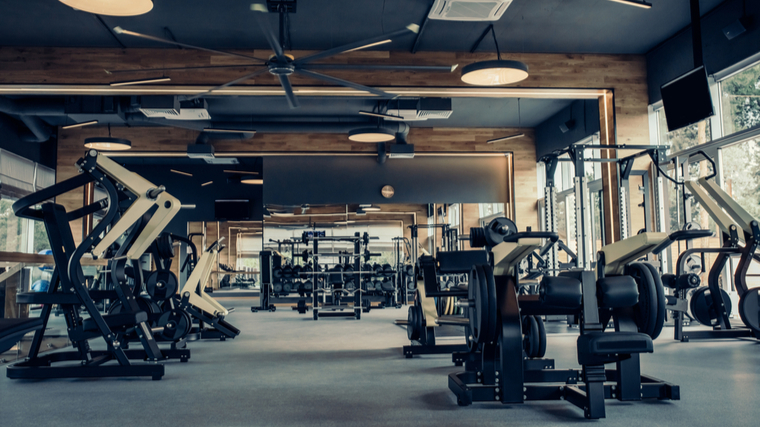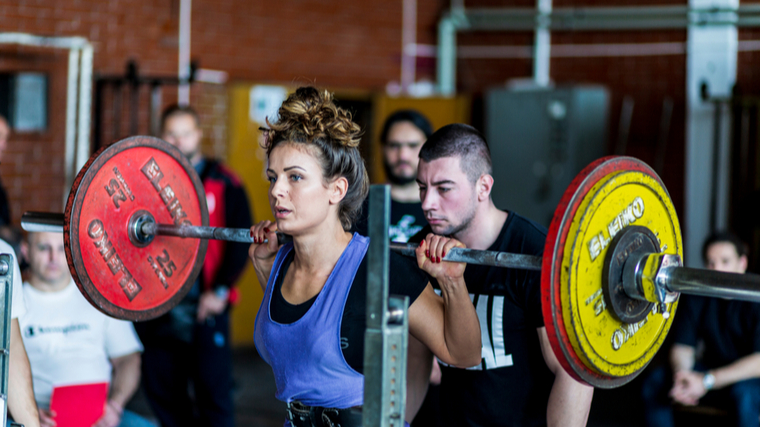Not everyone is an early bird. If your avian allegiance aligns with the night owls, the prospect of getting up at the crack of dawn to do anything more than grab a glass of water or use the restroom probably turns your stomach.
Nonetheless, you might have had a recent change in your work schedule that forced you to find a new time to train. On the other hand, perhaps you’re just too tired to work hard in the gym after a long day, no matter how many scoops of pre-workout you take.

There’s merit to rising with the sun and hitting the iron in the early hours. Morning workouts are more than convenient — there are also some potential performance benefits in store if you can get into the habit. Since that’s easier said than done, this guide will set you up for success and help you get your butt in gear in the morning.
- How to Prepare For a Morning Workout
- Benefits of Morning Workouts
- What to Consider Before Working Out in the Morning
How to Prepare For a Morning Workout
What sounds simple in theory can be treacherous in practice. You’ve undoubtedly set an alarm for an early hour plenty of times and smashed the snooze button plenty more. At 5:00 a.m., your phone’s wake-up call is far from soothing. Here’s how to get past it and ensure you get yourself to the gym promptly and ready to work.
Step 1 — Plan Your Workout in Advance
You should have a well-designed training program at your side in the first place, but this is doubly true when you’re trying to become a morning person. One of the best strategies for combating fatigue or tiredness is to remove as many variables as possible.
The less you have to wonder about or worry over when you’re getting out of bed, the more likely you are to stick to the plan in the first place. If you know what you’re going to do in the gym ahead of time, all you have to do is get yourself there. Also, you’re potentially more likely to take it easier than you normally would when you’re feeling sluggish and unmotivated. Having a plan ensures you do what you need to — regardless of the time (and your level of enthusiasm).
Step 2 — Pack & Prep the Night Before
If you’re not used to waking up early, the prospect of having to pick out your gym outfit or pack up your gym bag can be just stressful enough to make you throw in the towel altogether. (At the very least, not having your stuff ready is another excuse to bail.) But if you take the time before bed to lay out what you’re wearing and whether you’ll need your weightlifting shoes, lifting belt, or wrist wraps, once you roll out of bed the next day you can just grab your stuff and go.
The less you have to worry over or think about right after you wake up, the more likely you are to actually make it to the gym.
Step 3 — Move Your Alarm
The allure of the snooze button can be the bane of your existence in the early hours. To avoid five extra minutes morphing into thirty, place your phone across the room from your bed. The same idea applies if you use a conventional alarm clock — the motion of getting up to turn off the alarm should be just enough to break inertia and get you going in the morning.
Step 4 — Hydrate and Caffeinate
To get yourself from half-asleep to pulling a heavy deadlift, you must dust off your internal systems well before you set foot in the weight room. To that end, chugging a small glass of cold water when you get out of bed can help awaken your digestive and regulatory processes.
Further, an empty stomach means that supplementing with a stimulant like caffeine should work better than if you ingested it after a meal. Caffeine is well-known for its ergogenic benefits, but some research indicates that it improves alertness and mood if taken in the morning — provided you keep your dosage in the 200-to-300-milligram ballpark. (1)
Step 5 — Eat Something Small
There’s nothing wrong with training on an empty stomach. Some athletes even thrive on it. If fasted training is your thing, power to you. On the other hand, a small meal like two eggs and a cup of oatmeal or even a meal replacement shake could help put some pep in your step in the gym.
When it comes to aerobic output specifically, some literature suggests that training completely fasted shortly after waking may dampen your performance in cardiovascular workouts. (2)
However, short-term fasting has little to no measurable physiological effect on the results you get from resistance training. If you tolerate — or even prefer — lifting on an empty stomach, there’s no reason not to. Just make sure that your post-workout nutrition is on point.
Step 6 — Do Some Light Cardio
If you’ve got your logistics squared away and make it to the gym, you should probably take a few minutes for a light cardio warm-up before grabbing your first weight. Whether you hit the elliptical or work through a kettlebell circuit, some total-body movement will get your blood pumping and help your body recognize that it’s time to work.
Benefits of Morning Workouts
Unfortunately, gravity isn’t any less forgiving in the weight room at the crack of dawn. However, that doesn’t mean that the time of day has no bearing on the outcome of your workout. There are both physiological and logistical factors at play that may help convince you to train well before noon.
A Convenient Schedule
Even if you have the world’s best home gym and don’t need to commute, your training sessions might take up a significant chunk of your day. A midday or late afternoon session can cause a schism in your productivity, and it’s perfectly normal to have no zest for exercise if you have to lift after a long day at the office.
By checking your workout off your to-do list first thing in the morning, you’ll undoubtedly have more open space in your schedule later on. Exercising early in the day is a great way to make use of time that you couldn’t necessarily fill with other activities anyway.
Better Consistency
Establishing and maintaining a routine is wonderful for improving your motivation and consistency, no matter what time of day you choose to hit the iron. That said, you may find it a bit easier to adhere to your workout plan if you put the gym first — figuratively and literally.
There’s something to be said for pushing yourself in the gym when everyone else is sound asleep in their beds. Moreover, you might find it hard to talk yourself out of training if there aren’t as many other options for filling the time. If you manage to wake up early anyway, you may as well train.
An Empty Gym
Few things can disrupt a well-thought-out workout more than a crowded gym. From idle patrons taking up space on the floor to the dreaded dumbbell hoarder, if your regular hour in the weight room is packed to the brim, early morning workouts could be your saving grace.
Most gyms see a predictable ebb and flow of usage over the course of the day. Mid-morning, around lunchtime, and early evenings tend to draw the crowds. If you can get in before things get hectic, you’ll likely find much of the equipment free for the taking. Nothing beats walking in the door and snagging your favorite squat rack right away.

Beyond convenient access to equipment, training in the off-hours tends to place you around others who are similarly dedicated. Most people who bother to wake up before the sun aren’t at the gym to goof off, so you might end up with a new lifting buddy or a highly reliable spotter.
More Gains, Potentially
The scientific community has spent plenty of time studying the interaction between your daily schedule and when you work out, but unfortunately, lifting in the early morning isn’t the secret sauce for muscle growth.
Your results in the gym come largely from internal factors — your nutrition, sleep habits, and training choices — instead of external or environmental ones. (3) However, there are some interesting interactions between your natural circadian rhythm and your physical activity habits.
Some literature has shown that your cardiovascular endurance is more robust and easier to train in the morning than in the evening, possibly due to better systemic management of fatigue markers like lactate. (4)
Further, other papers argue that while you may be a better endurance athlete early in the day, your peak power output in cardiovascular exercises is higher in the evening. (5)
In the area of resistance training, things are less clear. While some studies indicate that strength adaptations may be more sensitive to morning training versus evening, (6) a larger body of evidence showcases little difference in your muscle-gain potential specifically. (7)
Moreover, more targeted research has shown that if you’re trying to develop multiple athletic qualities in tandem, such as strength and endurance, it may be more effective to exercise in the evening — but only if you can stick to it for several months at a time. (8) This argument isn’t yet comprehensively supported by other works, so take it with a grain of salt.
Consistently training in the morning may yield better gains, but that progress will probably come as a result of your being there on a regular basis at all, not just from clocking in before 9:00 a.m. With that in mind, if you’re trying to up your cardio game, morning sessions might have something going for them.
Reduced Stress
Whether you got a good night’s sleep or not, your cortisol levels — the hormone primarily responsible for regulating stress — are actually quite high in the morning. (9) While this is a natural consequence of the internal goings-on that take place while you’re asleep, no one enjoys feeling stressed out.
There’s some limited but compelling research supporting the idea that morning exercise, performed shortly after you wake, may help reduce the cortisol that has accumulated while you were sleeping. (7) It isn’t guaranteed by any means, but if you’re feeling tense at the start of the day, some light exercise could do wonders.
What to Consider Before Working Out in the Morning
Getting up early can be a hard sell on its own, and adding an intense workout on top of that might be a tall order for you. Like with any decision you make about your training or diet, you need to weigh the pros and cons.
Chronotype
If you’ve always felt more energized at night and foggy in the morning, or vice-versa, you should know it’s not just in your head. Emerging research has begun to document the nature of your “chronotype” as a means of explaining the high variability in daily energy levels. (10)
It’s common for some people to be perpetually tired in the mornings, irrespective of their personal habits. Conversely, maybe waking up early has always come naturally to you.
If your chronotype doesn’t align with the requirements of early-morning training, it might not be worth it to force the issue. As with any decision you make regarding your health, you should listen to your body.
Sustainability
There’s not much of a point in pushing yourself into a routine that you can’t sustain. If waking up early tarnishes your relationship with exercise and turns it into a chore that you dread, the trade-off of convenience or efficiency simply isn’t worth it.
For your training to be effective, it must be sustainable. There’s no sense in yanking yourself out of bed if doing so noticeably reduces the quality of your workouts or harms your relationship with physical activity. Early morning exercise isn’t for everyone, and that’s okay.
Competition Prep
Contrary to some of the factors that may dissuade you from exercising in the morning, if you’ve got a fitness competition of some kind on the horizon, adjusting your training schedule might be a wise move.
Some studies have noted that people tend to perform better at early-morning physical fitness tests if they imitate the conditions the morning prior. (4) Whether this is due to some physiological phenomenon or is a psychological occurrence is unclear.

However, it’s quite common for powerlifting or Olympic lifting events to take place in the early morning and run for the majority of the day. If you’re preparing to lift at a meet but aren’t used to working out in the morning, you might be in for an unwelcome shock on competition day if you have to try to bench a new personal record only a few hours after waking up.
If you know you’ll be exerting yourself at a specific event early in the morning, you should consider training in similar conditions — waking up early and hitting the gym at a time that will prepare you to perform your best when it matters.
Seize the Day
Whether you dwell in darkness or shine in the sun, what matters in the arena of muscle & strength gain is the effort you put in and the consistency with which you apply it. That said, the folks who leap out of bed at a quarter past five and crush a full-body workout before most people have finished brushing their teeth might be onto something.
Early morning workouts aren’t magic, but they’re more than convenient. Making your training your first priority of the day should help you get more value from the work you put in. It’s worth trying, and the results should speak for themselves.
References
1. Griffiths, R. R., Evans, S. M., Heishman, S. J., Preston, K. L., Sannerud, C. A., Wolf, B., & Woodson, P. P. (1990). Low-dose caffeine discrimination in humans. The Journal of pharmacology and experimental therapeutics, 252(3), 970–978.
2. Zouhal, H., Saeidi, A., Salhi, A., Li, H., Essop, M. F., Laher, I., Rhibi, F., Amani-Shalamzari, S., & Ben Abderrahman, A. (2020). Exercise Training and Fasting: Current Insights. Open access journal of sports medicine, 11, 1–28.
3. Seo, D. Y., Lee, S., Kim, N., Ko, K. S., Rhee, B. D., Park, B. J., & Han, J. (2013). Morning and evening exercise. Integrative medicine research, 2(4), 139–144.
4. Edwards, B. J., Edwards, W., Waterhouse, J., Atkinson, G., & Reilly, T. (2005). Can cycling performance in an early morning, laboratory-based cycle time-trial be improved by morning exercise the day before?. International journal of sports medicine, 26(8), 651–656.
5. Reilly, T., & Garrett, R. (1995). Effects of time of day on self-paced performances of prolonged exercise. The Journal of sports medicine and physical fitness, 35(2), 99–102.
6. Souissi, H., Chtourou, H., Chaouachi, A., Dogui, M., Chamari, K., Souissi, N., & Amri, M. (2012). The effect of training at a specific time-of-day on the diurnal variations of short-term exercise performances in 10- to 11-year-old boys. Pediatric exercise science, 24(1), 84–99.
7. Sedliak, M., Finni, T., Cheng, S., Lind, M., & Häkkinen, K. (2009). Effect of time-of-day-specific strength training on muscular hypertrophy in men. Journal of strength and conditioning research, 23(9), 2451–2457.
8. Küüsmaa, M., Schumann, M., Sedliak, M., Kraemer, W. J., Newton, R. U., Malinen, J. P., Nyman, K., Häkkinen, A., & Häkkinen, K. (2016). Effects of morning versus evening combined strength and endurance training on physical performance, muscle hypertrophy, and serum hormone concentrations. Applied physiology, nutrition, and metabolism = Physiologie appliquee, nutrition et metabolisme, 41(12), 1285–1294.
9. Lindholm, H., Ahlberg, J., Sinisalo, J., Hublin, C., Hirvonen, A., Partinen, M., Sarna, S., & Savolainen, A. (2012). Morning cortisol levels and perceived stress in irregular shift workers compared with regular daytime workers. Sleep disorders, 2012, 789274.
10. Randler, C., Schredl, M., & Göritz, A. S. (2017). Chronotype, Sleep Behavior, and the Big Five Personality Factors. SAGE Open.
Featured Image: FXQuadro / Shutterstock